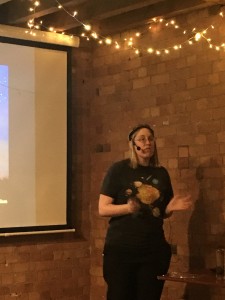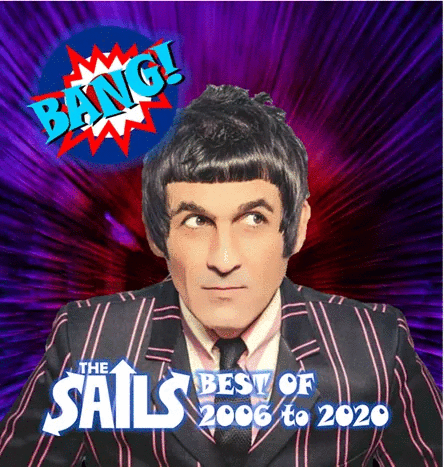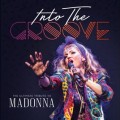We start with some of the ridiculous things that members of the public say to Alice on a regular basis:
“Oh, so you can predict the future”
“It’s all the same thing – worship of the universe”
“Why are we learning about the planets? We did this in year 7”
“Black holes are like organisms – they take in matter and spit out stuff they don’t need”
“We can feel the sun burning our skin and the planets give off light as well”
“Space? Isn’t that a boys’ thing?”
“I don’t know anything about that stuff, I did ‘real’ astrophysics”
Where did this lack of confidence come from? Newspapers do it report it accurately and the school curriculum is very dry so getting it across is dependent on the teacher. While basic science is taught in schools, there needs to be an improvement in the way science is presented in the media. People want to understand but they are often alone.
Some easy navigation – the moon always points to the sun, you can use it like an arrow. It’s a constant that the moon is lit by the sun but what we see on Earth changes. You will never see a full moon in daylight. There isn’t really a dark side of the moon though, it just appears that way because the same side of the moon always faces the Earth. Actually the dark side of the moon is always changing and there is no permanent dark side.
People still think that the moon has an effect on the water in our bodies. While gravity does affect everything, the effect seen on the seas is mainly due to the “sloshiness” of water – we notice it moving much more easily. The Earth and the moon orbit a common centre of mass, which accounts for the two tides, one on each side of the planet. Everything is pulled on though, even CERN had to take this into account when building the Large Hadron Collider. The so-called “body tides” that pull on the land can move things by up to 3cm, can affect the Earth’s magnetic field and have to be accounted for in GPS devices.
“Astronomy is for old men in anoraks” There is a systematic bias in astronomy and only 25% of astronomers are women. Around the age of 14, girls decide that astronomy isn’t for them. Female astronomers even get let Hubble Space Telescope time. We can change these attitudes though.
“Astronomy is done by lone geniuses in ivory towers” The figure that everyone has in mind here is Einstein but even he evaluated the work of other scientists and he was part of a discussion group. He was taught Riemannian mathematics by his friend Marcel Grossmann and his job at the patent office taught him how to pick things apart. He didn’t think up all of his ideas out of the blue – he built on many experiments and ideas. Genius is collaboration. Of the 10 most recently submitted papers on arXiv, only one has a single author.
The sun cannot be one a black home – it isn’t big enough. It has to be a certain weight for gravity to overcome electron repulsion. When this happens a white dwarf becomes a neutron star. A black hole is even heavier, over eight times the weight of the sun.
“It somehow matters what we call Pluto” It doesn’t really matter and the definition of words change over time, for example computer, marriage, or even planetary nebula (which used to mean a planet) Even the word planet itself used to mean a “wandering star”, so-called by the Greeks when they first noted the odd tracks of planets. Only with telescopes were they resolved as disks. Do we care what we call Pluto purely because it has some history? The discovery of Uranus lead to the search for another planet that was affecting the orbits of Uranus and Neptune. In 1931, Clyde Tombaugh spent 10 months comparing pictures for movement and Pluto was assumed to be the culprit. I’m the 1970s, the Voyager mission updated us on the masses of Pluto and Neptune. In 1990, the Hubble Space Telescope resolved Charon, showing that Pluto was actually part of a binary system. In 2006, Hubble discovered Pluto’s other moons. In the same year, several other objects were discovered in the same orbit as Pluto – are these planets too or a new type of object.
There are hundreds of dwarf planets in the Kuiper belt, should these all be upgraded along with Pluto? Most of the collisions that were going to have happened out here have already happened – this is why trans-Neptunian objects don’t hit Neptune. However, we all care about Pluto because it has been personified and it was the first planet to be discovered by a schoolgirl. However, it really doesn’t matter how we refer to it.
“Only maths matters in astronomy – everything else is just hand waving” What’s wrong with too much maths? Many people are put off maths at school and are encouraged to drop it before choosing a career. It’s very hard to get back into later in life. Having said that, a lack of maths shouldn’t prevent people from getting involved in astronomy.
“Dark matter is just an idea to make the equations fit” In the 1930s it was observed that galaxies are moving apart faster than they should. Then in the 1970s, it was discovered that the weight of the universe is more than it should be based on what is observable. There is now a new theory – Modified Newtonian Dynamics that looks to deal with these contradictions.
“Explosions cause chaos not order” The name of the Big Bang was a joke, it wasn’t an explosion. “Where is the centre of the universe?” Everywhere! The universe used to be smaller but it is all around us – the inside is bigger than the outside!
“All this research takes money away from starving Africans” The bank bailout cost more than every cent spent on NASA in its entire history.
“What has space ever given us” GPS, weather monitoring, synthetic limbs and climate change research amongst other things. “It’s nothing to do with me” Actually it is. Astronomy can help to answer some of the big questions. Where did we come from? Where are we going? Are we alone? Why are we here?
Uranus and Neptune are ice giants. The ice at the core is both frozen and very hot. If this sounds confusing, remember that water actually has 13 different states.
The IAU says that to be defined as a planet, a body must fulfil these two criteria:
1) It has to be round and spherical
2) It has to have swept out its local area of anything else (although technically Jupiter hasn’t done this as it has asteroids at its Legrange points)
This is why Pluto isn’t technically a planet.
There is still some interesting stuff out there. For example, Betelgeuse, a star in the constellation of Orion, may go supernova during our lifetime. The last time a star went supernova was around 1000 years ago and it was so bright that it could be seen during the day on Earth. We only know about it because it was recorded by Chinese and Native American astronomers.
Skeptics In The Pub returns to The Canalhouse on March the 7th at 7:30 where Paul Duncan McGarrity will invite you to “Ask An Archaeologist” For more information check out the SitP website: http://nottingham.skepticsinthepub.org/




